Managing Ego in Relationships
Don’t Let Ego Destroy Your Relationship
How to Manage Ego in Relationships

Empathy Over Ego | Managing Ego in Relationships
Relationships thrive on connection, understanding, and emotional harmony. But what happens when ego sneaks into the equation, creating distance rather than closeness? Despite its subtlety, unchecked ego can erode the very foundation of a relationship, turning love into a competitive or defensive battle.
This guide explores the role of ego in relationships, how it manifests, and practical strategies to cultivate self-awareness and empathy. Together, we can uncover how to move past ego-driven interactions and towards a more compassionate and fulfilling relationship.
Understanding Ego in Relationships

What is ego in the context of relationships?
Ego isn’t just a psychological concept; it’s a key player in how we relate to ourselves and others. Within relationships, ego often shows up as self-centeredness or a need to protect one’s image and pride. While a healthy sense of self is important, the ego becomes problematic when it overtakes empathy, turning conversations into power struggles or accusations.
How does ego manifest in daily interactions?
The manifestations of ego in relationships are subtle but impactful. For instance:
- Seeking to ‘win’ arguments rather than resolving them through understanding.
- Avoiding vulnerability out of fear of rejection or judgment.
- Prioritizing being right over being kind.
- Holding grudges due to a refusal to forgive or apologize.
Small ego-driven habits can pile up, creating tension, resentment, and even emotional shutdowns over time. Recognizing these patterns early is essential to prevent significant harm.
Signs of Ego Causing Issues in Relationships
Ego can easily slip into your relationship dynamics without you realizing it. Here are some common behaviors to look out for and their impact on the bond between partners.
Common Ego-Driven Behaviors
- Defensiveness in Conversations
Example: Your partner expresses concern about feeling neglected, and you respond with, “I work so hard for this family. You don’t appreciate me.”
Impact: Emotional walls go up, leaving the original concern unaddressed.
- Reluctance to Apologize
Example: A mistake is made, yet one partner avoids saying “I’m sorry” to safeguard their pride.
Impact: Resentment brews, and trust starts to weaken.
- Dismissal of Feelings
Example: Laughing off or minimizing a partner’s emotions with phrases like, “You’re overreacting” or “That’s not a big deal.”
Impact: Feelings of invalidation can lead to disconnection and hurt.
Real-Life Impact of Ego Behaviors

Consider a couple, Maya and Ryan. Ryan consistently criticized Maya’s career choices, framing it as “constructive feedback.” For Maya, this led to feelings of inadequacy and discomfort in voicing her opinions. Once they uncovered and addressed the ego-driven behaviors behind Ryan’s criticism, they began reconnecting with mutual understanding and compassion.
The Impact of Ego on Relationship Health
Left unchecked, ego can damage even the strongest of bonds. Here are some of the long-term effects that ego may have on your relationship’s health.
Negative Effects of Ego
- Communication Breakdown
Ego acts as a roadblock to honest, open communication. Disagreements turn into heated debates, and constructive discussions fade under high emotions.
- Constant Unresolved Conflicts
“Fights” tend to drag on because ego resists resolution. Apologies seem impossible, and issues resurface in future arguments.
- Relationship Dissatisfaction
Over time, an ego-driven dynamic can sap joy and fulfillment, making one or both parties feel lonely or misunderstood in their partnership.
When empathy takes a backseat to ego, relationships move away from teamwork and towards an unhealthy sense of competition or isolation.
Strategies for Overcoming Ego in Your Relationship
Addressing ego in your relationship might sound daunting, but with the right steps, it’s completely achievable. Below are foolproof strategies for kicking ego habits and fostering a stronger and more empathetic bond.
Step 1: Practice Self-Awareness
Awareness is the first step to change. Reflect on your interactions with your partner. Are there moments where you’ve been defensive, dismissive, or reluctant to compromise? Journaling or mindfulness exercises can help uncover these patterns.
Step 2: Choose Empathy Over Ego
Think about situations from your partner’s perspective. Instead of simply reacting, pause and ask yourself, “How does my partner feel about this situation?” Active empathy strengthens emotional intimacy and reduces misunderstandings.
Step 3: Prioritize Communication
Practice active listening. When your partner speaks, focus on understanding their emotions and perspective without planning your response. Reflect back what they’ve shared—this ensures both clarity and connection.
Step 4: Apologize and Forgive
Learn to accept responsibility when you’re at fault. A heartfelt “I’m sorry” can diffuse tension and show your partner you value their feelings over your pride. Equally, forgiveness is key to releasing pent-up frustration and strengthening trust.
Step 5: Seek Professional Help
Sometimes, navigating ego issues may require an outside perspective. Couples counseling provides valuable tools and an unbiased space to work through difficult dynamics together.
Real-Life Success Stories
Success stories provide both hope and inspiration. Take, for instance, Sarah and James, a couple who weathered years of ego-driven arguments that centered around finances. Once they committed to prioritizing empathy and practicing active listening, the conflicts diminished. They now make decisions together with mutual respect and understanding.
Another couple, Priya and Alex, discovered that journaling about their conflicts helped untangle ego from genuine emotions. They became intentional with apologies and saw significant changes in how they related to each other.
These stories underscore one powerful truth—growth is possible when both partners commit to meaningful change.
Transform Your Love Beyond the Ego
Ego is a natural part of the human experience, but it doesn’t have to dictate your relationship dynamics. By practicing self-awareness, prioritizing empathy, and fostering open communication, you can reduce ego’s impact and create space for a deeper, more fulfilling connection.
If you’re noticing persistent challenges in your relationship, don’t hesitate to seek help from a relationship expert. Remember, every step taken to address ego is a step toward building a partnership rooted in love and mutual understanding.
Your relationship deserves it—start your transformation today.